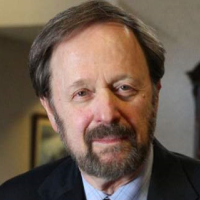State Scores Rare Win in Decades-Long Court Fight with Inventor over Taxes
 Gilbert Hyatt (photo: K.M. Cannon, Las Vegas Review-Journal)
Gilbert Hyatt (photo: K.M. Cannon, Las Vegas Review-Journal)
California really, really wants inventor Gilbert Hyatt to pay state taxes on his windfall income from patents covering the original microprocessor chip, belatedly recognized by the courts.
There have been ups and downs in the 22-year-old titanic struggle. The high for Hyatt, 76, might have been when a Nevada jury awarded him more than $500 million in his lawsuit against California for its behavior in the slugfest. The low point might have been when the Nevada Supreme Court reduced that judgment to $1.5 million—at least until this month.
U.S. District Judge Garland Burrell Jr., in Sacramento, ruled (pdf) that the state can continue to pursue its claim against Hyatt for a piece of the $40 million he earned in 1991 after being granted a patent he first sought in 1970. Interest and penalties have swelled the state’s claim to $55 million.
In anticipation of earning millions for the “single-chip, integrated-circuit computer architecture,” which until then had widely been credited to Intel and Texas Instruments, the Californian moved to Nevada that year, where the tax laws were more favorable.
California’s Franchise Tax Board (FTB) audited him in 1993 and said he owed substantial taxes for 1991 and a huge penalty payment for fraud. Hyatt said he had already moved and wasn’t a resident of the state when he earned the money.
The FTB audited his 1992 taxes in 1996, the same year the U.S. Patent and Trademark Office reversed a big chunk of its decision.
Hyatt sued the FTB in Nevada in 1998, claiming their investigation included “invasion of privacy, outrageous conduct, abuse of process, fraud and negligent misrepresentation.” The FTB said it couldn’t be sued in Nevada courts, but in 2003 the U.S. Supreme Court said they could. That’s the suit that netted Hyatt a fleeting $500 million. He appealed that Nevada high court ruling to the U.S. Supreme Court, too.
The FTB has been considering Hyatt’s administrative appeal for the last six years, a process the board says Hyatt has frustrated at every turn. He argued to the court that the tax assessments are unconstitutional and so is the FTB process of “pay-then-protest,” which denies him due process of the law.
He sought an injunction “forbidding Defendants . . . from continuing the investigation and administrative proceedings against” him and “forbidding Defendants . . . from continuing to assess or threaten to assess [Plaintiff], or collect or threaten to collect from [Plaintiff], taxes, penalties or interest.”
The state responded that the federal Tax Injunction Act prevented Hyatt from challenging its residency-based tax assessment in federal court. The judge said the law applies if there is a state remedy available to fight the assessment and the FTB appeal process does just that.
–Ken Broder
To Learn More:
California Wins a Round in Epic Tax Fight with Nevada Inventor (by Dale Kasler, Sacramento Bee)
Inventor Waits 43 Years for Another Chance to Shock Tech (by Susan Decker and Ian King, Bloomberg)
Who Invented the Microprocessor?...Hyatt v. Patent Office (by Ken Broder, AllGov)
Gilbert P. Hyatt v. John Chiang et al (U.S. District Court Eastern District of California) (pdf)
- Top Stories
- Controversies
- Where is the Money Going?
- California and the Nation
- Appointments and Resignations
- Unusual News
- Latest News
- California Forbids U.S. Immigration Agents from Pretending to be Police
- California Lawmakers Urged to Strip “Self-Dealing” Tax Board of Its Duties
- Big Oil’s Grip on California
- Santa Cruz Police See Homeland Security Betrayal in Use of Gang Roundup as Cover for Immigration Raid
- Oil Companies Face Deadline to Stop Polluting California Groundwater





